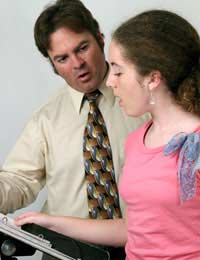Phoniatrics

Phoniatrics is a medical term used to describe the area of research into and treatment of the organs involved in speech production, speech habits and the science of speech. The mouth, throat (larynx), vocal cords and lungs all fall into this category. Speech disorders and vocal loading related problems are just a few of the problems researched and treated in phoniatrics.
Speech Disorders
There are many speech disorders in existence today, and phoniatrics attempts to research these disorders to gain a better understanding of their causes, symptoms and how to treat them. Just a few of the disorders that fall into this category include:- Aphasia - a condition that makes communication difficult because an individual has trouble with language while they are talking, listening, writing and/or sometimes using numbers. Aphasia is sometimes also called dysphasia.
- Apraxia of Speech/Dyspraxia – a disorder which leaves individuals unable to consistently and correctly say what they mean. There are two main types of apraxia of speech, developmental apraxia of speech (individuals are born with) and acquired apraxia of speech (the result of injury or illness).
- Cluttering – a disorder in which an individual’s speech accelerates to a more rapid pace than normal, when the individual (often unconsciously) repeats syllables or phrases, and/or when an individual goes back to repeat things multiple times in an effort to make his or her speech more clear.
- Dysarthria – a disorder characterised by imprecise, slow and/or distorted speech. In layman’s terms, it is slurred speech.
- Dysprosody – a disorder, sometimes also called psuedo-foreign dialect, characterised by alterations in the intensity, timing and rhythm, cadence and/or intonation of words. In layman’s terms it means that an individual’s accent, or the way in which they pronounce and speak words, is altered as may be their patterns of speech.
- Lisps - speech disorders in which individuals are unable to produce a specific speech sound (or sounds).
- Selective Mutism – a disorder in which an individual, usually a child, who is comfortable with and fluent in verbal language when (s)he is relaxed becomes unable to speak in particular settings. Usually these settings are in public, such as at school or at a social gathering.
Vocal Loading Related Problems
Vocal loading is a term used to describe stress put on the speech organs (mouth, throat, vocal cords and lungs) when speaking for long periods. Teachers/lecturers, individuals involved in sales and entertainers are just a few of the types of people who use their voices consistently and as the primary tool of their trade. Phoniatrics researches how this stress comes about, and how it can be alleviated to both prevent and treat vocal problems.It is now known that dry air, dehydration, loud speech, smoking and air pollution all have adverse effects on the voice. It is also known that eating a healthy diet, resting the voice and hydrating properly are positive methods of caring for the voice. Though vocal loading related problems affect millions of individuals every day, this area of research and treatment is still considered relatively minor and progress in the area is not a quick as it might be otherwise. Speech therapists and vocal coaches in particular are usually able to tell others how to care for and preserve their voices.
- Speech Therapy: Target Sounds
- Getting a Hearing Test
- Finding an Appropriate Speech Therapist
- The Lidcombe Program
- Auditory Verbal Therapy
- Vocology: a Form of Speech Therapy
- Tracheostomy & Ventilator Swallowing and Speaking Valves
- New Earpiece to Help With Stammering
- Technology to Aid Therapy of Speech Disorders
- Speech-Language Pathologists
- Speech-Language Therapy
- Speech Therapy and Learning Disabilities
- Where Will Speech Therapy Take Place?
- What is Speech Therapy?
- Augmentative and Alternative Communication
- What Can Parents Do to Help their Children's Speech Therapy?
- Who Will Benefit from Speech Therapy?
- What Happens During a Therapy Session?


Re: Augmentative and Alternative Communication
Kak esehiko sminor k112 speechdisorder.co.uk
Re: The Lidcombe Program
My 3 year old has started to stammer about 5 weeks ago and has progressed very fast and now it affect every word she pronounces and I am…
Re: Child Abuse and Speech Disorders
I stopped talking to my dad in my normal voice when I was in grade 1 after he hit me because I couldn’t understand my…
Re: New Earpiece to Help With Stammering
I am interested in being assessed for the use of the SpeechEasy hearing device and would be grateful if someone could…
Re: The Lidcombe Program
I don’t know what else to do ..
Re: New Earpiece to Help With Stammering
I have a Stammer and have always struggled with my speech and I think this would really help me and so many others.
Re: The Lidcombe Program
Sir I only stutter when speaking to others. Not when, I speak to myself can you tell me what's the problem.
Re: The Lidcombe Program
I am 23 years I am supering from stammer please how can I get vaccine for ti
Re: Expressive Language Disorder
I have a lot to ask . Please reach out. Thank you
Re: The Lidcombe Program
My age is 32...when IAM speaking difficulty to say word...IAM disappointed in my life only reason is stammring..plz help me...